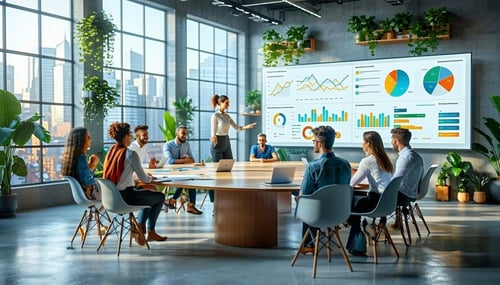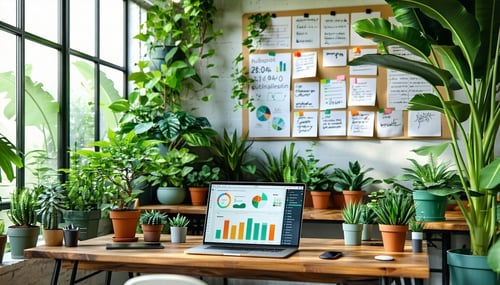How to Align Marketing & Sales for Faster Revenue Growth in the Sustainability Sector
Why Sustainability Businesses Need a Stronger Marketing & Sales Approach in 2025
The sustainability sector is evolving faster than ever, shaped by shifting policies, economic uncertainty, and technological advancements. Green businesses, renewable energy companies, and ESG-focused firms must rethink their marketing and sales strategies to stay competitive. In 2025, success will require a blend of data-driven decision-making, AI-powered automation, and impact-driven messaging that aligns with consumer and investor expectations.
While sustainability initiatives continue gaining traction, business leaders in this sector face increasing challenges—long B2B sales cycles, uncertain policy landscapes, and the need for greater differentiation in a crowded market. To overcome these obstacles, companies must focus on demand generation, CRM optimization, and AI-enhanced marketing strategies.
This guide explores the key trends shaping sustainability marketing and sales in 2025 and provides actionable strategies to help green businesses thrive.
Key Trends Shaping Sustainability Marketing & Sales
AI & Automation in Lead Generation
The use of artificial intelligence (AI) and automation is transforming how sustainability companies generate leads and nurture prospects. In 2025, AI-powered tools will:
- Enhance lead scoring & segmentation by analyzing customer behaviors and interactions.
- Automate personalized outreach, making content and email marketing more effective.
- Predict customer needs, allowing sales teams to engage prospects at the right moment.
⚡ Actionable Tip: Leverage AI-powered CRM and marketing automation tools like HubSpot, Drift, and Clearbit to streamline lead generation and engagement.
The Role of ESG & Impact-Driven Marketing
As sustainability issues take center stage in corporate decision-making, Environmental, Social, and Governance (ESG) initiatives are no longer optional—they are a competitive advantage. In 2025, B2B buyers, investors, and regulators will demand greater transparency and impact reporting.
What does this mean for marketing?
- Storytelling around ESG impact will be essential for customer trust and investor confidence.
- Third-party verification & certifications (such as B Corp, LEED, 1% for the Planet, or Carbon Neutral) will become key differentiators.
- Regulatory alignment will be critical, with businesses needing to communicate compliance with sustainability policies.
⚡ Actionable Tip: Develop content highlighting your company’s ESG impact, such as case studies, sustainability reports, and video testimonials from clients and stakeholders.
Data-Driven Strategies for Sustainable Growth
To navigate uncertainty, sustainability businesses need a data-first approach to marketing and sales. Companies that effectively leverage analytics will be able to:
- Identify high-value leads & prospects faster.
- Optimize marketing campaigns by tracking performance metrics.
- Personalize customer experiences, increasing conversion rates.
⚡ Actionable Tip: Use HubSpot’s marketing analytics, Google Data Studio, or Tableau to gain insights into campaign effectiveness and customer behavior.
Demand Generation: What’s Changing & What’s Working?
Traditional demand generation strategies are evolving, and green businesses must adapt to these changes to stay ahead. Some of the most effective approaches for 2025 include:
✔ Account-Based Marketing (ABM): Personalizing outreach to high-value prospects rather than casting a wide net.
✔ Content Marketing with SEO and AI Search Optimization: Creating long-form, high-value content that educates buyers and establishes thought leadership.
✔ Social Selling & LinkedIn Outreach: Leveraging LinkedIn for targeted engagement and relationship-building with decision-makers.
✔ Webinars & Virtual Events: Positioning your business as an industry leader through educational content and expert-led discussions.
⚡ Actionable Tip: Build a multi-touch demand generation strategy that combines SEO, paid advertising, LinkedIn outreach, and strategic content marketing.
The Importance of CRM & Sales Enablement in Sustainability Sectors
Long sales cycles and complex buyer journeys make CRM optimization and sales enablement crucial for sustainability businesses. To ensure sales teams operate efficiently, companies must:
- Adopt a robust CRM strategy to track interactions and streamline follow-ups.
- Align sales and marketing teams to ensure seamless lead nurturing.
- Leverage automation to reduce manual work and improve response times.
⚡ Actionable Tip: Implement HubSpot CRM for better lead tracking, automation, and reporting. Use sales enablement tools like Avoma to analyze sales interactions and improve closing rates.
Preparing for 2025’s Market Challenges
The sustainability sector will continue facing economic and policy-related challenges, but businesses that embrace AI, data-driven decision-making, and ESG storytelling will stand out and thrive. By prioritizing CRM optimization, demand generation, and strategic automation, sustainability companies can navigate uncertainty while accelerating growth.
📌 Next Steps:
- Audit your current marketing & sales strategy to identify gaps.
- Invest in AI-driven automation to enhance lead generation.
- Strengthen your ESG communication & impact storytelling.
- Optimize your CRM & sales enablement processes to drive revenue growth.
Want help implementing a sustainability-focused marketing & sales strategy? Let’s talk 🚀
![Blog [It’s Not Easy] Being Green (600 x 600 px)](https://blog.grazianimultimedia.com/hs-fs/hubfs/Blog%20%5BIt%E2%80%99s%20Not%20Easy%5D%20Being%20Green%20(600%20x%20600%20px).png?width=600&height=600&name=Blog%20%5BIt%E2%80%99s%20Not%20Easy%5D%20Being%20Green%20(600%20x%20600%20px).png)


